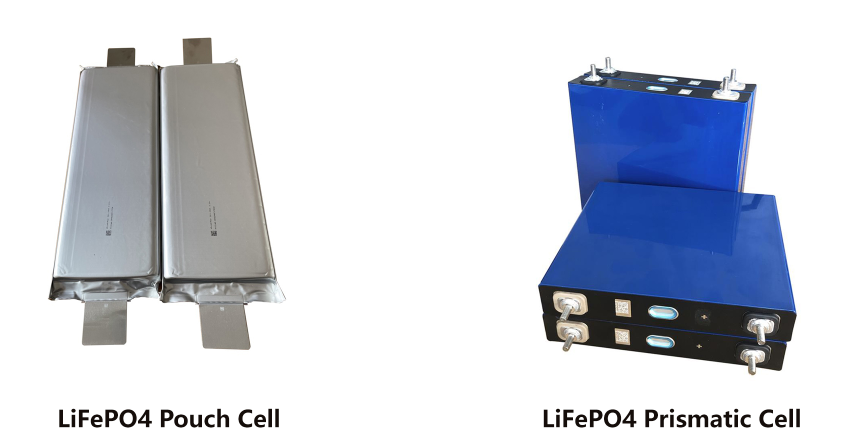Lithium iron phosphate batteries (LiFePO4 Battery) are gaining popularity due to their impressive features, including high current ratings, long cycle life, thermal stability, and enhanced safety compared to other lithium-ion batteries. These batteries are available in different cell formats, with the most common being prismatic, pouch, and cylindrical designs. This article explores the key differences between LiFePO4 pouch cells and prismatic cells, helping you determine which option is the best fit for your specific application needs.

LiFePO4 pouch cells are named after their distinctive flexible, foil-like enclosures. The cathode, anode, and separator layers are stacked or wound together and then sealed within an aluminum-plastic laminate pouch. This design creates a flat, flexible cell ideal for applications requiring custom shapes and thin profiles.
Advantages of LiFePO4 Pouch Cells
Pouch cells offer several advantages, making them a popular choice in various applications:
Thin Profile: These cells can be as thin as 4mm since they don't require bulky metal casings, maximizing space efficiency.
Lightweight Design: The flexible pouches are lighter compared to metal enclosures, reducing overall product weight.
Adaptability: Pouch cells can be customized to fit unique shapes and spaces, making them ideal for compact designs.
Effective Cooling: Their large surface area aids in efficient heat dissipation, enhancing thermal management.
Additional Benefits of LiFePO4 Pouch Cells
Apart from their flexible form factor, LiFePO4 pouch cells provide other valuable benefits:
Enhanced Safety: The pouch design reduces the risk of leaks and is resistant to swelling or fire hazards.
Cost Efficiency: Manufacturing pouch cells is often more cost-effective than producing prismatic cells.
Higher Capacity: Pouch cells can achieve greater capacities within the same volume compared to other cell types.
Material Efficiency: The minimalist design requires fewer materials, optimizing production efficiency.
LiFePO4 prismatic cells feature a rectangular prism shape. These cells are constructed by stacking layers of cathode, anode, and separator materials inside a rigid metal casing. The metal enclosure offers robust structural integrity but makes the cells less adaptable than pouch designs.
Advantages of LiFePO4 Prismatic Cells
Prismatic cells come with their own set of advantages:
Durable Metal Casing: The rigid metal enclosure provides enhanced structural strength, making them more resistant to vibrations and shocks.
Ease of Assembly: The standardized rectangular shape allows for efficient automated production and assembly.
Effective Cooling: The metal casing offers better thermal conductivity, enhancing heat dissipation.
Cost Efficiency at Scale: In high-volume manufacturing, prismatic cells can be more cost-effective due to standardized production processes.
When comparing LiFePO4 pouch cells to prismatic cells, several factors come into play:
Design Flexibility: Pouch cells are thinner, lighter, and offer more design flexibility, making them suitable for custom-shaped batteries.
Structural Strength: Prismatic cells are more durable due to their metal casing, providing better resistance to vibrations and shocks.
Production Efficiency: Prismatic cells are easier to mass-produce due to their uniform shape, enhancing automated assembly.
Cooling Efficiency: The metal casing in prismatic cells improves thermal conductivity, aiding in better heat dissipation.
Volumetric Energy Density: Pouch cells generally provide higher volumetric energy density, maximizing capacity in compact spaces.
Cost Considerations: Prismatic cells may be more cost-effective at very high production volumes due to standardized manufacturing.
Both pouch and prismatic LiFePO4 cells excel in different applications based on their unique characteristics:
LiFePO4 Pouch Cell Applications
Pouch cells are ideal for applications requiring lightweight, thin, or custom-shaped batteries, including:
Wearable devices
Drones
Mobile robots
Medical devices
IoT devices
Custom battery designs
LiFePO4 Prismatic Cell Applications
Prismatic cells are preferred in applications that demand structural strength and high energy capacity, such as:
Energy storage systems
Electric bicycles
Electric motorcycles
Automotive applications
Power tools
Solar energy storage systems
The choice between LiFePO4 pouch cells and prismatic cells depends on the specific requirements of your application. Here's how to decide:
Choose Pouch Cells If: You need a lightweight, adaptable design for custom shapes and thin profiles. Pouch cells are ideal for compact, portable devices where flexibility and volumetric energy density are priorities.
Choose Prismatic Cells If: You require robust structural integrity and high shock resistance. Prismatic cells are better suited for applications exposed to vibrations, such as automotive or industrial energy storage systems.
No single format is universally better than the other. The ideal choice depends on your application's size constraints, environmental conditions, safety requirements, and production needs.
Lifepo4 battery provide long cycle life, high current ratings, and enhanced safety. Within the LiFePO4 family, pouch cells and prismatic cells offer unique advantages tailored to different applications. Pouch cells provide thin, lightweight, and flexible designs, while prismatic cells deliver rigid structural integrity and enhanced durability.
By understanding the pros and cons of each cell type, you can select the optimal design to meet your battery requirements. Whether you need a custom-shaped lightweight battery or a robust energy storage solution, LiFePO4 technology offers reliable and safe performance.
When selecting between LiFePO4 pouch cells and prismatic cells, consider the specific demands of your application to make an informed decision and maximize the benefits of this advanced battery technology.
Next:16pcs Winston TSWB-LYP400AHA Lifepo4 batteries Ship to Namibia
Previous:Lifepo4 Batteries: An Essential Tool for Natural Disaster Relief and Recovery
Contact Person: Miss. Elsa Liu
| WhatsApp : | +8617763274209 |
|---|---|
| Skype : | +8617763274209 |
| WeChat : | 17763274209 |
| Email : | Elsa@lifepo4-battery.com |